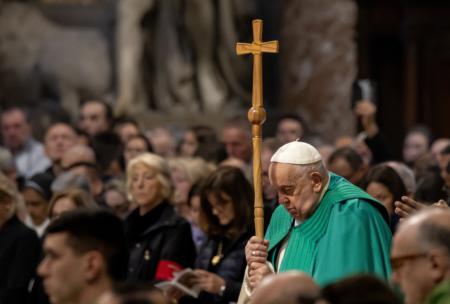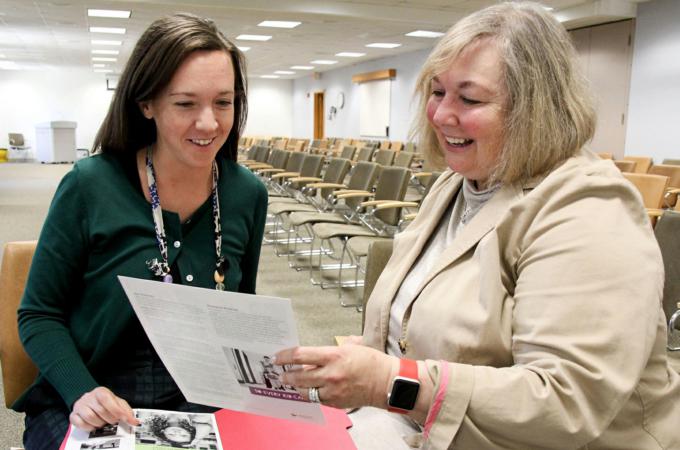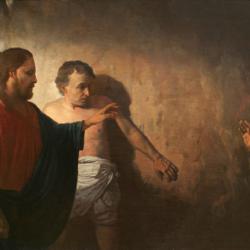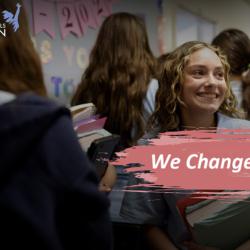Franciscan Children's, archdiocese partner on youth mental health program
BRAINTREE -- On average, about one in five children and adolescents have a mental illness. In about 50 percent of cases, an illness can be seen and diagnosed in a child before the age of 14. Indicated by statistics, failure to address and seek treatment for youth mental illnesses can have significant negative consequences, including poor performance in school, trouble with the law, unemployment, substance abuse and suicide.
The Archdiocese of Boston and the Franciscan Children's hospital in Brighton took note of the statistics, and after announcing a partnership in October 2017, have publically unveiled a new collaborative program, the "Kids Healthy Minds Initiative," that aims to provide outreach and education throughout the greater Boston area on youth mental illnesses.
In youth experiencing a mental illness, "if we intervene early enough... we could change the downstream effects of suicide, of drug abuse, of early involvement in the criminal justice system, of chronic absenteeism," said Patricia Coffey, Mental Health Educator and Outreach Coordinator at Franciscan Children's, and a point person of the initiative.
Through education, the initiative seeks to increase community awareness about "the youth mental health crisis," teach people to spot possible early signs of mental illnesses, and decrease the stigma and misinformation around mental illnesses.
Coffey, a licensed social worker with her own practice and years of experience serving youth, will be one of the people responsible for providing that education, traveling to parishes and schools across the archdiocese to give presentations.
In a joint interview May 8 with MC Sullivan, Chief Health Care Ethicist and Director for Initiative on Palliative Care and Advanced Care Planning for the Archdiocese of Boston, Coffey said the plan to is roll out the initiative almost in phases. This first year, the idea is to make the presentations available more at an adult level, with a focus on educating parents, clergy, and parish and school staff. In the second year, she will focus on presenting to students, youth groups; mainly children and adolescents.
"It will likely be an hour-long education session... all evidenced based," said Coffey. "We'll talk about the statistics, how prevalent (mental illness) is, as well as the myths and misconceptions about mental illness, so, speaking about stigma."
"Then, we'll review common diagnoses in children and adolescents, and how these diagnoses can be precursors" to later negative effects, she said.
"We'll talk about what we can do as a community to make changes," Coffey continued. "For example, changing our language around mental illness, making it a person-first language. Instead of saying 'that person is bi-polar,' saying 'that person is living with bi-polar disorder.'''
Sullivan, an instrumental figure with Cardinal Seán P. O'Malley in the creating of the initiative, said the "whole person" approach on healthcare will be taught.
A fairly recent but growing approach, "whole person" care addresses a person's physical, mental, and spiritual problems and needs. It has its roots in palliative care, a method of care Sullivan has promoted throughout the country, and Sullivan said that approach will help eliminate some of the stigma that still clouds views on mental illness.
Many people, she said, still view mental illness as a "character flaw," a health issue that isn't actually a health issue. "Whole person" care encourages mental health to be viewed on the same level as physical health, both an influencer of and influenced by it, therefore allowing for a better understanding of the severity of mental illnesses.
"If we shine a light on something, suddenly it normalizes it, it kind of reduces the stark contrast and things start to blend in. I think that's what we have to do in our society, and I think that's part of what will come out of the education that they'll get from Patricia and her colleagues at Franciscan Children's," said Sullivan.
Coffey added that "mental illness should be treated in the same light" as physical illness, that anxiety or depression be viewed in the same way as, for example, diabetes.
The education, in order to reach as many people as possible, can be given through a variety of platforms, including videos, webinars, parish and community meetings, and CCD and confirmation classes.
Franciscan Children's, one of the largest providers of youth mental health services in the state, will largely be responsible for actually providing the education. Sullivan explained that the partnership between the archdiocese and Franciscan Children's has the archdiocese, with its large and diverse audience, more in the role of "opening doors."
"Cardinal Seán -- in his wisdom, and I really believe the spirit is at work through him -- has seen this holistic approach to what makes us fully human," said Sullivan.
"We are body, we are soul, and we are spirit, and how do we treat all that? And we are relational, so we keep the psycho-social stuff going. It's exciting to see what he has put in place for this mosaic of wellness in our archdiocese," she continued.



















